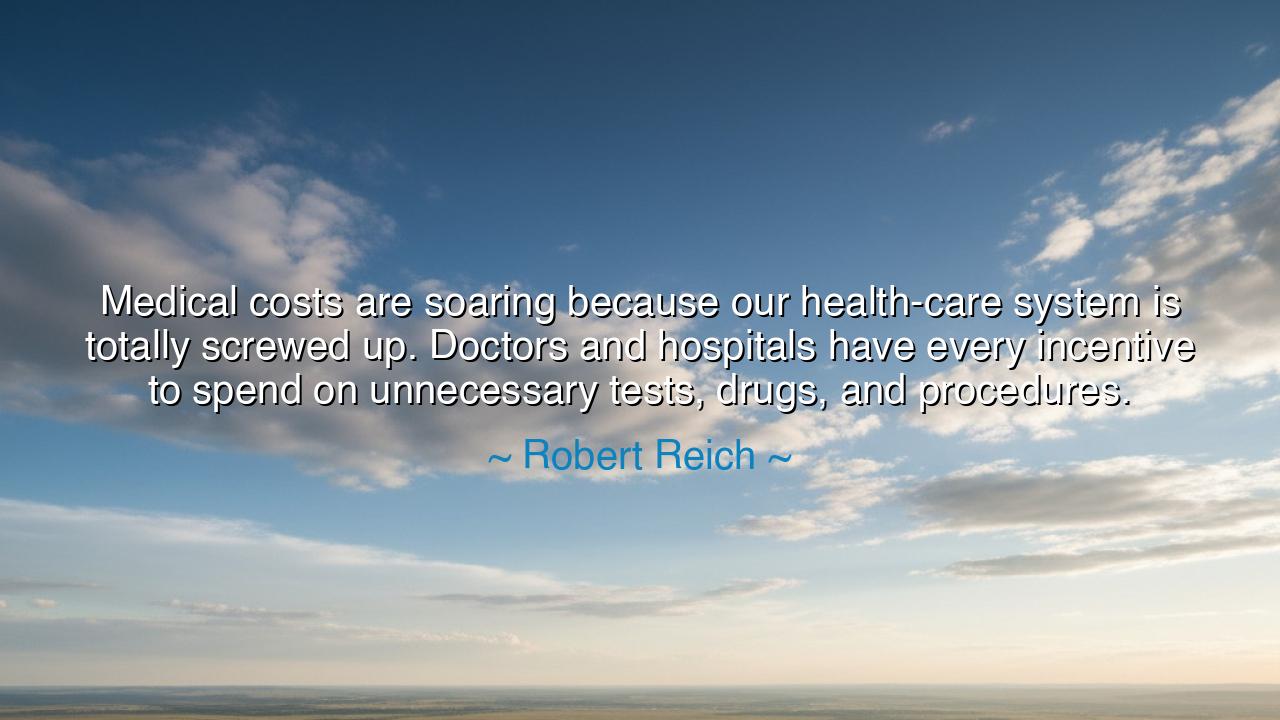
Medical costs are soaring because our health-care system is
Medical costs are soaring because our health-care system is totally screwed up. Doctors and hospitals have every incentive to spend on unnecessary tests, drugs, and procedures.






When Robert Reich declared, “Medical costs are soaring because our health-care system is totally screwed up. Doctors and hospitals have every incentive to spend on unnecessary tests, drugs, and procedures,” he stripped away the polite language of policy and spoke with the directness of a prophet. His words strike not only at the structure of economics, but at the very heart of justice, for they reveal a system where profit too often outweighs compassion, and where healing is tangled with greed.
The first truth he names is the crisis of soaring medical costs. In every age, societies have grappled with the price of health, for nothing is more sacred than life. Yet Reich reveals that in America, the costs rise not solely from scarcity or necessity, but from misaligned incentives. The system rewards excess, not prudence—rewarding not the prevention of disease but the multiplication of treatments, not the preservation of health but the consumption of procedures. The result is a people crushed beneath bills, while institutions thrive on the very suffering they were meant to alleviate.
The second truth lies in his charge that doctors and hospitals have incentives to overspend. Here, Reich does not accuse every physician of malice; rather, he speaks of a system that shapes behavior through profit. When the rewards of the system are tied to quantity rather than quality, then excess becomes inevitable. This echoes the wisdom of the ancients: that when structures are corrupted, even the virtuous are ensnared. A crooked framework warps even noble intentions, just as a cracked vessel cannot hold pure water.
History offers us sobering examples. In Rome’s late republic, corruption within the grain supply system led to inflated prices that starved the poor while enriching merchants and officials. The system itself was “screwed up,” rewarding hoarding rather than distribution. Similarly, in the Middle Ages, indulgences became a lucrative practice for the Church—offered in the name of salvation, but twisted into a trade that exploited fear for profit. Reich’s critique of modern health care belongs to this lineage of warnings: when sacred institutions turn to profit over purpose, the people suffer.
The deeper meaning of Reich’s words is that a system built on misaligned incentives cannot produce justice. Medicine, whose calling is to heal, must not be governed by the same rules as trade in luxury goods. For while a man can live without jewels or silks, he cannot live without health. To treat medicine as a marketplace commodity, where the more one spends the more one gains, is to forget that illness is not choice but vulnerability. The soaring costs become chains, binding families in debt even as they fight for survival.
For us, the lesson is clear: if we would honor life, we must demand systems that reward healing rather than exploitation. We must question not only the prices we pay, but the structures that determine them. Do not accept the illusion that more tests and procedures always mean better care; seek wisdom in prevention, in simplicity, and in compassion. The true physician heals with discernment, not excess, just as the true leader governs with restraint, not spectacle.
Practical wisdom follows: advocate for reforms that align incentives with patient health, not institutional profit. Support policies and leaders who prioritize accessibility and prevention. In personal life, question unnecessary procedures, seek second opinions, and strive for a lifestyle that reduces dependency on costly interventions. Above all, remember that respect for health begins with respect for life itself, not with the price tag attached to it.
Thus, Robert Reich’s words endure as a cry for justice. The health-care system may be “screwed up,” but it need not remain so. By realigning its purpose with its sacred calling—to heal and to preserve life—we can build a future where medicine serves humanity, not profit. Let us then act, as individuals and as a society, to ensure that healing is never weighed down by greed, and that the cost of life is not beyond the reach of the living.






AAdministratorAdministrator
Welcome, honored guests. Please leave a comment, we will respond soon